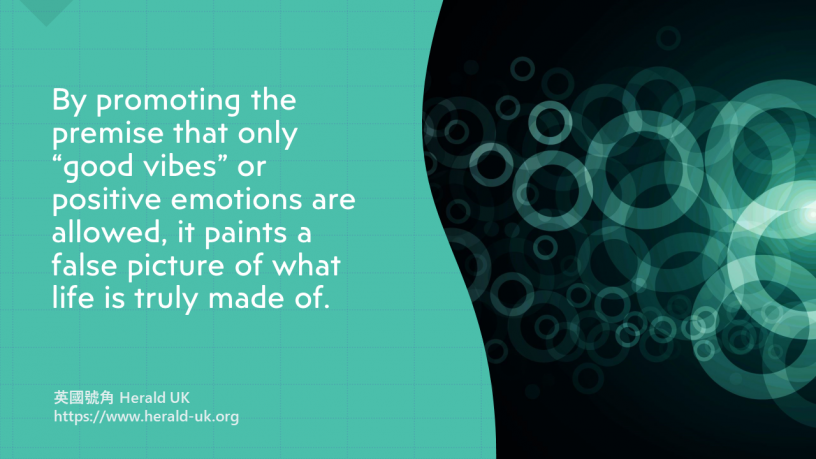Wynne C
Many people love motivational quotes! They give us the push we need when we don’t feel productive. They open our eyes to a different perspective. They change our outlook on life. If done right, they can be very powerful life-changing tools.
In recent years, I have noticed a culture that promotes “good vibes only” as a way to motivate people to have a positive mindset. It is not difficult to find people on social media who post photos of themselves enjoying their lives doing something fun or relaxing, and adding a caption or hashtag along the lines of “good vibes only”. The premise of this culture is that we should always aim to be positive and live our best lives.
On the face of it, having a positive mindset at all times seems like a great idea! Nothing can faze you because you are invincible. Nothing can bring you down because you choose to look on the bright side every time, right?
Unfortunately, the “good vibes only” culture does not work. We as humans are programmed to have a range of emotions. We are capable of being happy, sad, angry, excited, fearful, disappointed, anxious and the list goes on. This is our natural response to things that happen to and around us. We are not one-dimensional robots that are only capable of one type of emotion.
By promoting the premise that only “good vibes” or positive emotions are allowed, it paints a false picture of what life is truly made of. It gives us false expectations that nothing is a big deal as long as we think positively. It also shuts people down from sharing about their struggles or asking for help. It fosters an environment that does not encourage sharing of difficult emotions. We are led to think that people do not want to hear about our problems.
When we receive good news about a promotion at work, we are so excited to tell our loved ones. When we succeed in something we tried hard for, we are happy and proud of our achievements. We are not afraid of others knowing that we feel happy or excited. In fact, we openly celebrate these moments! When we experience betrayal, we feel angry and hurt. When we lose an opportunity at school or work, we feel disappointed. When we are faced with uncertainty, we feel fearful. Yet these emotions are not talked about. In the “good vibes” culture, they are frowned upon. They are classed as inferior to positive emotions. They are not valid or welcome.
There are, of course, more subtle ways we might be pushing “good vibes only” on people. For example, when we ask someone to look on the bright side, when we say, “At least you have your health (or job or family)” or “It could be worse” to someone who is deeply hurting. These statements might have been said with the best intentions, yet they make the other person feel like their problems are being brushed off. They may even feel guilty of being ungrateful for the “silver linings” in their lives.
There is absolutely nothing wrong with being optimistic in the face of difficult times but no one should be pressured into always thinking, acting or being positive. That is an impossible expectation for anyone. The healthiest way of processing emotions is not to mask or hide them away, but to speak up and share with our trusted loved ones.
As for those who want to be a better son, daughter, father, mother, partner or friend to our loved ones, learn to sit with them and listen. Learn to ask the right questions. Acknowledge that their feelings are valid. We may not have all or any of the answers, but we don’t have to. We only need to be present and empathetic.











